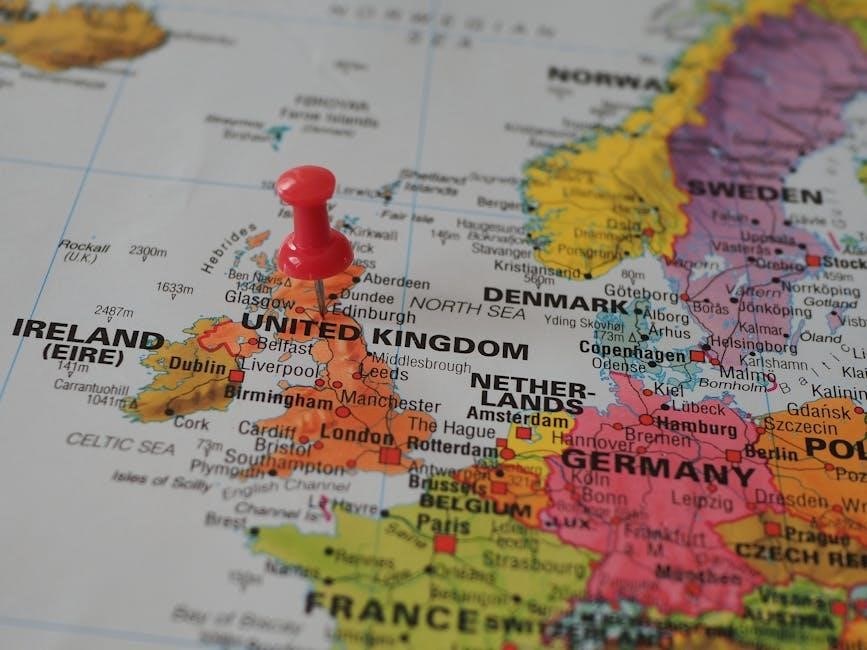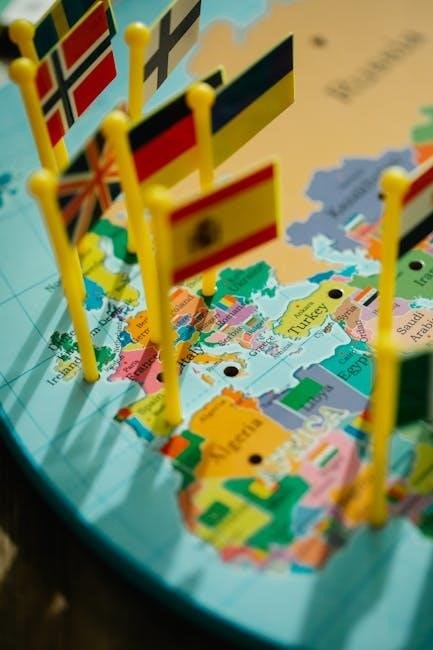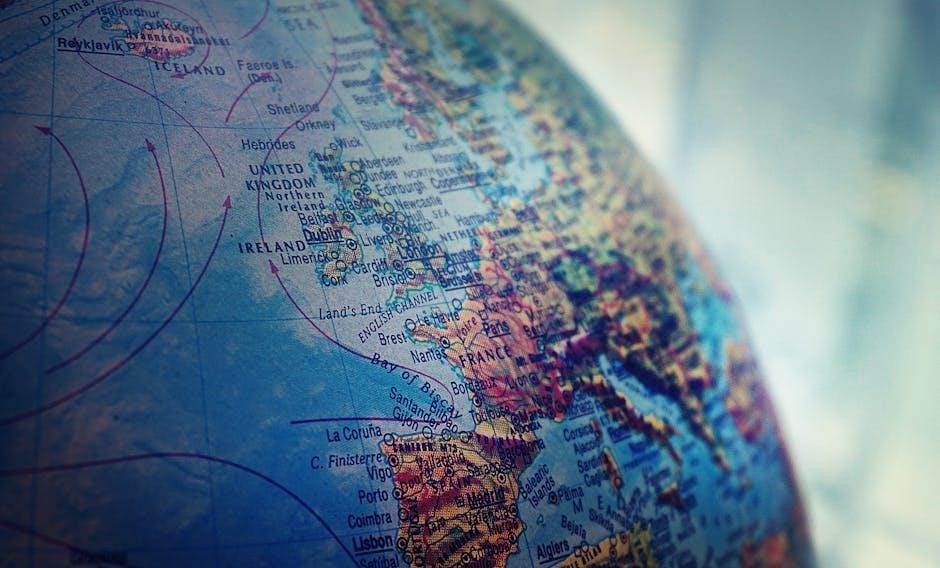Globalization is a multifaceted phenomenon integrating economic, cultural, political, and technological aspects across the world. It fosters interconnectedness among diverse regions, shaping modern societies and economies while addressing challenges like inequality and cultural homogenization.
Definition and Overview
Globalization is the process of increasing interconnectedness among countries, fostering economic, cultural, and technological exchanges. It involves the integration of global markets, societies, and ideas, driven by advancements in communication, transportation, and trade. This phenomenon has reshaped modern societies, creating opportunities for growth while raising concerns about inequality and cultural homogenization. Globalization is a complex, multifaceted concept that influences various aspects of human life, from economies to individual identities, making it a central focus of contemporary studies.
Historical Context of Globalization
Globalization’s historical context reveals its evolution from ancient trade routes to modern interconnectedness. It began with early exchanges of goods and ideas between civilizations, laying the groundwork for global integration. Over centuries, trade networks expanded, fostering cultural and economic ties. The Eurasian Exchange (1500-1800) marked a significant phase, highlighting globalization’s deep historical roots and its role in shaping the modern world.
Economic Globalization
Economic globalization refers to the increasing interconnectedness of the world’s economies through international trade, investment, and financial flows. It drives growth, fosters competition, and integrates markets globally.
International Trade and Investment
International trade and investment are cornerstone elements of economic globalization, fostering cross-border exchanges of goods, services, and capital. Globalization has significantly expanded these activities, creating interconnected economies. Companies engage in foreign direct investment, while multinational corporations drive global supply chains. The rise of cross-border mergers and acquisitions further accelerates economic integration. Trade agreements and technological advancements reduce barriers, enabling seamless transactions. This interconnectedness stimulates economic growth, enhances competition, and distributes resources more efficiently worldwide, making international trade and investment key drivers of globalization.
Impact on Global Economies
Globalization has profoundly shaped global economies, fostering interconnectedness and economic interdependence. It has spurred growth in developing nations by opening markets and creating jobs, while developed economies benefit from cheaper goods and services. However, it has also led to wealth disparities, as gains are unevenly distributed. Economic power shifts between regions, with emerging markets gaining prominence. Globalization accelerates technological diffusion, boosting productivity, but also causes job displacement in sectors vulnerable to outsourcing and automation, highlighting both opportunities and challenges for economies worldwide.
Role of Multinational Corporations
Multinational corporations (MNCs) are central drivers of globalization, operating across borders to maximize efficiency and profits. They facilitate the flow of capital, technology, and goods, fostering economic interdependence. MNCs often dominate global markets, influencing local economies and cultures. Their practices can spur development through job creation but also face criticism for exploiting resources and labor. MNCs shape global trade policies and standards, making them pivotal in the integration of worldwide economic systems and the expansion of global capitalism.

Political Globalization
Political globalization involves the growth of global governance and institutions, shaping international relations and policies. It reflects cooperation and conflict among nations, influencing sovereignty and global order.
Global Governance and Institutions
Global governance refers to the systems and institutions that regulate international relations, ensuring cooperation on issues like trade, security, and environmental sustainability. Key institutions include the United Nations, World Trade Organization, and International Monetary Fund, which facilitate dialogue and policy implementation. These bodies address global challenges, fostering multilateral agreements and standards. Their role in shaping national policies highlights the interconnected nature of modern geopolitics, balancing sovereignty with collective action for global stability and development.
Impact on National Sovereignty
Globalization has challenged national sovereignty by increasing the influence of international institutions and agreements over domestic policies. Nations often cede some autonomy to global governance bodies like the UN and WTO, balancing sovereignty with collective action. This shift reflects the trade-off between maintaining independence and addressing transnational issues. While globalization enhances cooperation, it also raises concerns about the erosion of state control, prompting debates on the future of national decision-making in a interconnected world.
Cultural Globalization
Cultural globalization refers to the worldwide spread of cultural practices, leading to homogenization and the blending of traditions. It fosters diversity while sometimes diminishing local identities.
Spread of Cultural Practices
Globalization has facilitated the widespread exchange of cultural practices, with technologies like the internet and social media enabling rapid diffusion of ideas, traditions, and values. Migration and international travel further accelerate this process, blending local and global customs. Popular culture, such as music, film, and fashion, often dominates, while local traditions may be overshadowed. This cultural exchange fosters diversity but also risks homogenization, as dominant cultures, like Americanization, influence global trends, reshaping identities and cultural landscapes worldwide.
Homogenization vs. Diversity
Globalization sparks a tension between cultural homogenization and diversity. While it spreads dominant cultures globally, often through media and consumerism, it also enables the exchange of diverse traditions. This duality creates a paradox: uniformity emerges in some areas, like fast food and fashion, yet globalization also fosters appreciation for cultural differences. The interplay between homogenization and diversity shapes identities, with local cultures adapting to global influences while resisting complete assimilation, leading to a complex cultural landscape.

Technological Globalization
Technological globalization refers to the integration of technology worldwide, fostering connectivity through the internet, mobile devices, and improved transportation, which bridges geographical divides and enhances global collaboration.
Role of the Internet and Communication
The internet and communication technologies have revolutionized globalization by enabling instant connectivity worldwide. Broadband, social media, and video conferencing tools have bridged geographical divides, fostering global collaboration. These technologies facilitate international trade, cultural exchange, and knowledge sharing, ensuring seamless communication across borders. The internet has become a cornerstone of modern globalization, driving economic growth and cultural integration while transforming how societies interact and function on a global scale.
Advancements in Transportation
Advancements in transportation have significantly accelerated globalization by connecting distant regions. Innovations like high-speed rail, container shipping, and air freight have reduced delivery times, enabling efficient global trade. Improved logistics and supply chain management have further enhanced the movement of goods and people worldwide. These developments have not only boosted economic growth but also fostered cultural exchange, making the world more interconnected and interdependent. Transportation advancements remain a cornerstone of modern globalization, driving progress and integration across borders.

Social and Environmental Impact
Globalization has profoundly shaped societies and ecosystems, driving inequality, cultural shifts, and environmental degradation. It demands sustainable practices to balance progress with ecological and social responsibility.
Migration and Labor Trends
Globalization has spurred significant migration and labor shifts, driven by economic disparities and job opportunities. Cross-border movements of workers have increased, fostering cultural exchange but also raising concerns about exploitation. Labor markets now face challenges like wage inequality and workforce displacement. The rise of multinational corporations has reshaped employment dynamics, often benefiting skilled workers while leaving low-skilled labor vulnerable. These trends highlight the complex interplay between migration, labor, and economic globalization, emphasizing the need for equitable policies to address disparities.
Environmental Consequences
Globalization has led to significant environmental challenges, including increased carbon footprints from industrial activities and transportation. Technological advancements, while reducing energy consumption, have also accelerated resource depletion. The expansion of global markets has often prioritized economic growth over sustainability, exacerbating issues like deforestation and pollution. However, globalization also fosters cooperation, enabling the sharing of environmental policies and innovations to address climate change. Balancing economic progress with ecological preservation remains a critical challenge in the globalized world.

Challenges and Criticisms
Globalization faces criticism for exacerbating income inequality, cultural exploitation, and environmental degradation. Critics argue it disproportionately benefits wealthy nations, often at the expense of poorer regions and local cultures.
Inequality and Exploitation
Economic globalization has led to increased income inequality, with wealth concentrated among elites. A study by the National Bureau of Economic Research highlights how globalization widened income gaps in the U.S., benefiting executives while leaving workers behind. While many have seen income gains, these benefits are unevenly distributed, often favoring developed nations over developing ones. This disparity fuels criticism, as globalization is perceived to exploit labor and resources in poorer regions for the profit of wealthier countries.
Cultural and Political Resistance
Globalization has sparked cultural and political resistance as communities resist homogenization. Traditional practices and languages face threats from dominant global cultures. Politically, nations resist external influences to preserve sovereignty. Movements often arise to protect local identities and industries, reflecting tensions between global integration and cultural preservation. These resistances highlight the complexities of balancing uniformity with diversity in an interconnected world.

Historical Development
Globalization traces its roots to ancient trade routes, evolving through colonialism, industrialization, and technological advancements. The 20th century saw rapid integration, reshaping economies and cultures worldwide.
From Ancient Trade Routes to Modern Globalization
Globalization began with ancient trade routes like the Silk Road, fostering cultural and economic exchanges. Over centuries, colonialism and industrialization expanded these connections. The 20th century saw rapid technological advancements, enabling modern globalization. Today, it encompasses global supply chains, digital communication, and interconnected economies, reflecting a dynamic evolution from ancient roots to a complex, worldwide system.
Contemporary Issues
Modern globalization faces challenges like rising inequality, environmental degradation, and cultural homogenization. Technological advancements and economic interdependence continue to shape global dynamics, while issues like migration and trade imbalances demand urgent attention, reflecting the complex nature of contemporary globalization.
Current Trends and Future Directions
Current trends in globalization highlight the rapid integration of digital technologies and the rise of sustainable practices. The future direction of globalization is expected to focus on balancing economic growth with environmental and social equity. Technological advancements, such as artificial intelligence and renewable energy, will likely shape global interconnectedness. Additionally, there is a growing emphasis on addressing inequality and fostering cultural diversity to ensure inclusive globalization. These trends underscore the need for adaptive policies to navigate the complexities of a rapidly changing world;
